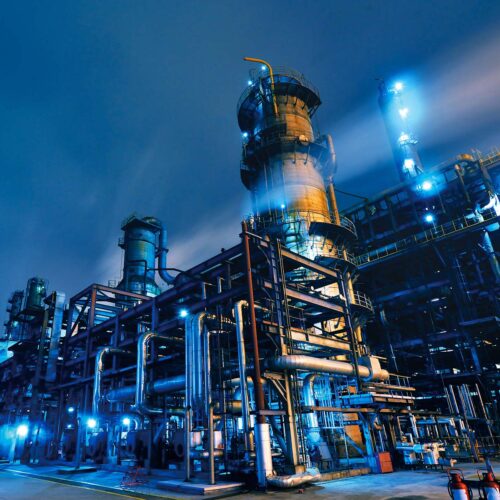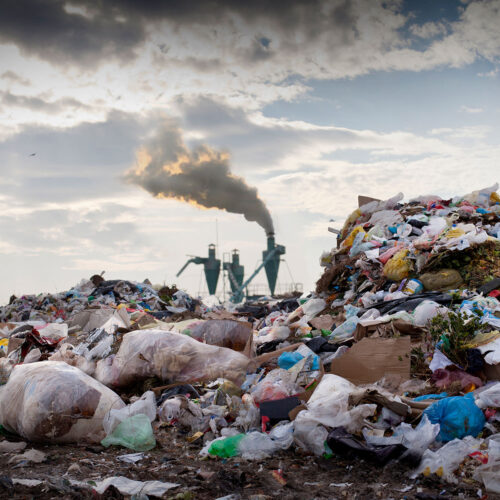Article
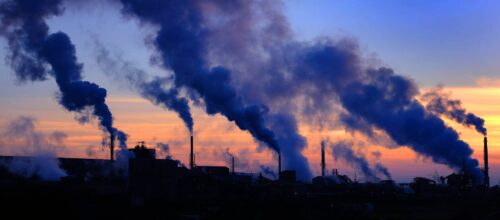
Reducing Emissions from Petrochemicals and Plastics
The Challenge and Opportunity
We must reduce greenhouse gas emissions and waste from the chemicals industry to secure a clean, low-carbon future while growing the global innovation economy.
Chemicals are vital to our everyday lives — and to the energy transition. While the industry accounts for 3 to 10 percent of global greenhouse gas emissions and creates a great deal of plastic waste — including single-use plastics that choke our oceans — it also provides critical materials like performance coatings for solar panels, battery components, refrigerants, and blade components for wind turbines.
Due to population growth and chemicals’ role in all aspects of human life and health, the mass of primary chemicals produced could grow 46 percent between 2022 and 2050, even in a net-zero scenario, according to the International Energy Agency.
RMI is working with partners to chart a path toward a low-emissions future by pushing for supply-side emissions cuts, demand-side disruption, and market activation. Our ongoing work in the industry highlights one key need: a shared vision for reducing emissions while supporting emerging market opportunities.
Article
Article
RMI’s Systems Approach
RMI is one of a few organizations broaching solutions to the climate and health risks of plastics and chemicals, from production to end of product life. We’ve globally mapped the largest direct contributors to climate pollution and frequently track how emissions from fossil feedstocks change over time. And our experts work in key regions around the world to ensure we’re addressing the impacts of the whole global supply chain. Building on these connections and this expertise provides the greatest opportunities to align plastics and chemicals production with a safer climate future. Taking a systems approach to this industry’s emissions reductions isn’t exclusively a climate play. “Recycling” carbon emissions provides the potential to make high-demand products like textiles and fuels — creating jobs and growth in the innovation economy.
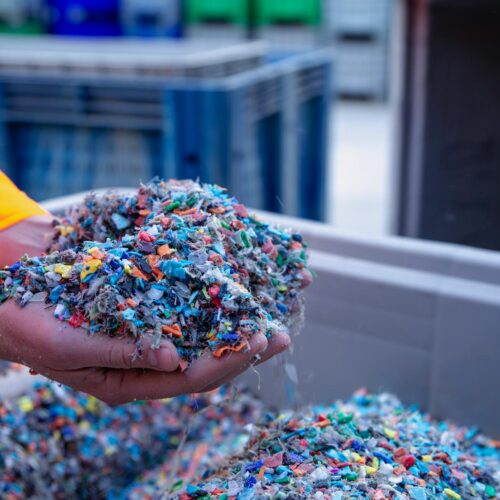
Emissions Visibility
Principles for emissions accounting and reporting can enable product differentiation aligned with global market demand and spur the sector’s investment in cleaner, safer technologies. RMI aims to reduce total oil and gas supply chain emissions associated with petrochemical production by distinguishing the emissions intensity of specific plastic sources, adding methane leak transparency, reporting on the amount of nonfossil material in products, and encouraging the highest-quality uses of renewable electricity.
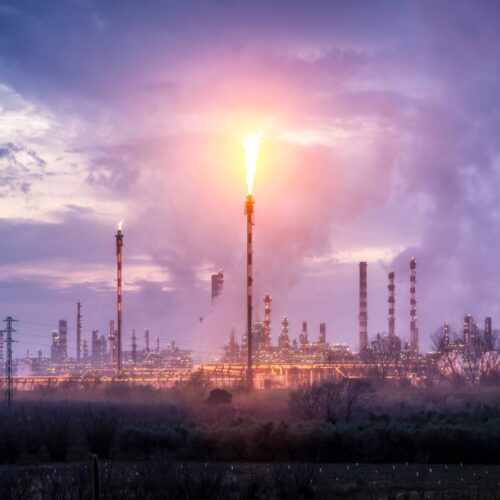
Industry Recalibration
Even if society turned off the tap and stopped using gasoline and diesel today, the oil industry would continue to play a role in producing petrochemicals, including the fiberglass resins used in wind turbine blades and the plastic components of solar panels. As more oil companies invest in petrochemical production to meet changing demand, RMI has identified key decarbonization milestones for the manufacturing industry to mitigate the climate impacts of producing organic chemicals.
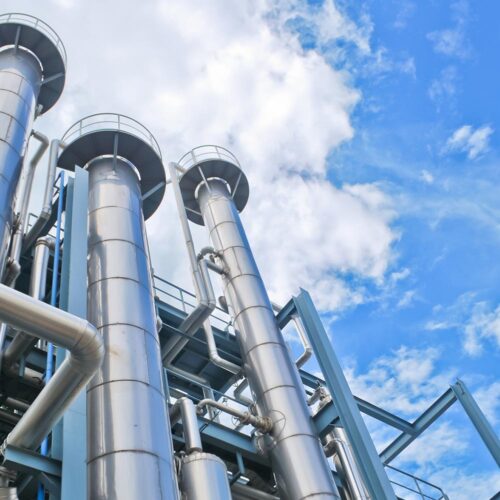
Net-Zero Strategy
RMI is accelerating the impact of early adopters and technology disruptors, who chart the course to a low-carbon future and inspire other industrial players to be fast followers. By providing techno-economic analysis of cutting-edge technologies, alternative feedstocks and novel catalysts, and plant-level implementation strategies, we can help the industry unlock low-emissions projects for chemical production at commercial scale.

Demand Reduction
RMI’s oil and gas industry experts have identified that there’s no need to increase conventional refining or primary high-value chemicals capacity if we take advantage of demand-reduction opportunities. We can slow or halt the growth of the fossil plastics industry if we leverage voluntary circular economy, policy, and financial incentives. Through a series of analyses of the textiles, packaging, and building materials supply chains, RMI has detailed the most promising demand-reduction opportunities to cut emissions from the petrochemicals sector.

Climate-Differentiated Products That Meet Global Market Standards
RMI is working across the chemicals value chain to demonstrate that there is a market for climate-differentiated goods and to help activate that market through demand aggregation. By creating mechanisms through which producers can realize differentiated pricing for low-emissions products, we can shorten the timeline to economic solutions and accelerate emissions reductions in the chemicals sector.

Technological Innovation
RMI and Third Derivative launched the Industrial Innovation Cohorts initiative to source, select, and support the most promising innovations in cement and concrete, iron and steel, and chemicals decarbonization. RMI is also developing an Advanced Innovation Roadmap to guide financial and intellectual resources to early stage research and development on the most promising and opportunities for emissions reductions.
RMI Insights
Case Study: Plastic – Amcor Plastic Container Pilot Test
Amcor piloted RMI’s best practice in plastic emissions reporting. Better data quality shows fossil-based plastics can still reduce emissions and that upstream methane emissions are too large to ignore compared to benchmark plastic intensities.
Polyester Reimagined: Evaluating the Impact of Textiles in Accelerating a Market for Low-Emissions Chemicals
How product definition drives emissions reductions in a climate-differentiated polyester value chain, and its role in stimulating demand for lower-emissions chemicals.
Lower-Emissions Fabrics of the Future: How to create a market for low-emissions clothes and textile products
We share insights from stakeholders along the polyester value chain to help understand challenges and opportunities in creating a market for low-emissions chemicals
Plastics Extrusion and Molding Greenhouse Gas Emissions Reporting Guidance
RMI’s Plastics Extrusion and Molding Greenhouse Gas Emissions Reporting Guidance
Plastic products should tell you how clean they are. Here’s how they can.
Our new guidance will help buyers clean up the plastics industry.
How Fashion and Furniture Can Lead Toward a Market for Lower-Emissions Polyester
Polyester - a fiber used in clothes, carpets, and textile products - is currently made from fossil fuel-based chemicals. With the fashion industry being a first mover in adopting low-emission & circular materials, this article explores polyester as a potential value chain for accelerating demand for low-emission chemicals.
Thermal Batteries: Electrifying Heating in Chemical Plants
A guide to bringing thermal batteries to chemical and refining plants across the United States.
From Waste to Value: How Carbon Dioxide Can Be Transformed into Modern Life’s Essential Products
The chemicals industry faces a dual challenge: removing fossil fuels as both the building block and fuel source of its products. This article explores the role of an emerging technology innovation - ‘CO2 utilization’ - in decoupling the chemicals industry from fossil fuels.
How Hydrogen Could Clean Up the Chemicals Industry
Hydrogen will play a critical role in emissions reductions in the chemicals industry through its targeted use as a feedstock and fuel source.
Seeding a New Pathway: The Opportunity for Distributed Green Ammonia
A distributed model for green ammonia can bring additional price stability, lower emissions, and a more predictable fertilizer supply to those who need it the most.
Clean Energy 101: Ammonia’s Role in the Energy Transition
Ammonia is an essential commodity right now for fertilizer production, which needs to be decarbonized as soon as possible to reduce global warming.
Clean Energy 101: The Chemicals and Climate Connection
The health risk of exposing ourselves to dangerous chemicals is well-known, but the overall climate risk of these products has flown under our collective radar.
The Five Dimensions of Hydrogen
The Why, What, Who, Why, Where, and When of RMI’s work on clean hydrogen to date.
We Can Cut Petrochemicals Use Today: Textiles
Clothing textiles can reduce demand for petrochemicals by using preferred fibers and prioritizing high-quality, long-lasting garments designed for circularity.
We Can Cut Petrochemicals Use Today: Buildings
Buildings can become healthier and more carbon efficient by reducing petrochemical use in construction and renovation.
We Can Cut Petrochemical Use Today: Plastic Packaging
Data-driven ranking of natural gas sources by their methane emissions has allowed MiQ to make climate performance a market differentiator, using measurable methane cuts.
Addressing Plastics’ Climate Risk
Petrochemicals like plastics are key to modern life but generate 3% ¬– 10% of global GHG emissions. These briefs break down petrochemical demand and ways to cut it.
Corporate Carbon Neutrality: Strategic Options, Action Framework, and Best Practices
The Case of Heavy Industry
Clean Energy 101: All Plastics Aren’t Created Equal
How a plastic is made can have a 350 percent difference on its level of life-cycle emissions.
Clean Energy 101: Reducing Climate Pollution from the Plastics Industry
We need a clearer picture of carbon emissions from plastic, so we can decarbonize the production and disposal of this common material.
Oil Refining Emissions Cut Points
This report outlines a full value chain approach to decarbonizing oil refining for petrochemicals like plastics in line with a safer climate future.
Emissions Out the Gate
Refineries and petrochemical plants are beginning to be rightfully recognized as a significant source of greenhouse gas emissions.
Transforming China’s Chemicals Industry
RMI analyzes China’s chemicals industry decarbonization pathways, with demand forecast and technical and economic feasibility.
Decarbonizing Refining and Petrochemicals: Big Challenges, Big Opportunities
New RMI analysis reveals that US refineries emit almost 30 percent more than has been disclosed through industry self-reporting.
Decarbonizing Hard-to-Abate Industries: The Importance of a New Accounting Method
We must distinguish between the emissions intensity of virgin and recycled inputs in hard-to-abate industries to activate the low-carbon market.
Refrigerant Reclamation
Assessment of the potential emissions impact of R-410A refrigerant reclamation in the United States’ Residential HVAC Sector.

